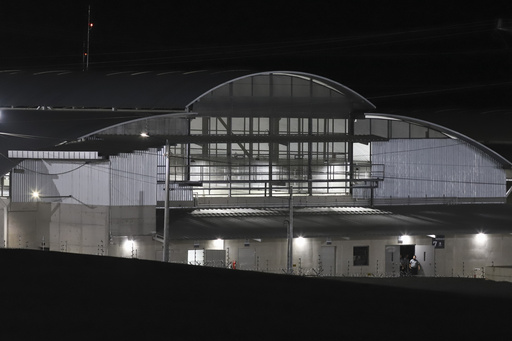
SAN SALVADOR, El Salvador — On Monday, a deal was announced between the Trump administration and the president of El Salvador, allowing the U.S. to transport both detained undocumented migrants and incarcerated American citizens to the Central American country. This agreement comes amid El Salvador’s ongoing efforts to combat powerful street gangs, during which the government has temporarily suspended several fundamental rights.
U.S. Secretary of State Marco Rubio indicated that the government is aware of the legal complexities involved in deporting American citizens and remarked, “There are obviously legalities involved… We have a Constitution.” He went on to describe the arrangement as a “very generous offer,” suggesting that any final decision would rest with the administration.
President Nayib Bukele has consistently emphasized El Salvador’s harsh prison conditions as a hallmark of his tough stance on crime. Since the initiation of his anti-gang campaign in March 2022, law enforcement has reportedly arrested over 84,000 individuals, many of whom have faced minimal due process in the judicial system. Before the current crackdown, El Salvador’s prison system was already infamous for its violence and overcrowding, while the Terrorism Confinement Center, or CECOT, has become emblematic of Bukele’s severe strategies. This facility, which was inaugurated in 2023, has been praised and criticized alike for its extreme conditions.
In videos shared by Bukele, detainees are seen being paraded into prison yards while dressed in minimal clothing, forced to sit closely together, and housed in cells that lack sufficient beds. Bukele commented on this shift in public safety, asserting that “El Salvador has managed to go from being the world’s most dangerous country to the safest country in the Americas,” attributing this transformation to the extensive incarceration of criminals.
Bukele had plans to increase the prison population even before his recent collaboration with Rubio.
The CECOT itself was established in response to the escalating gang violence, with construction ordered by Bukele as the anti-gang campaign commenced. Located in Tecoluca, approximately 45 miles from the capital, the facility was designed to accommodate 40,000 inmates, featuring eight large pavilions. Each cell reportedly houses between 65 to 70 prisoners, and inmates do not receive visitors or opportunities for rehabilitation. There are no structured programs aimed at reintegration into society; rather, some prisoners participate in infrequent motivational talks or supervised exercise.
Bukele’s justice minister has asserted that those incarcerated at CECOT are not expected to return to their neighborhoods. Facilities like the dining areas, break rooms, and gyms are allocated solely for the use of guards.
As of April 2021, prior to the emergency measures being implemented, El Salvador reported nearly 36,000 inmates. Although regular updates on these figures are sparse, a human rights organization noted that by March 2024, approximately 110,000 individuals were held in the nation’s prisons, which serve a population of around 6.36 million.
Human rights advocates have raised concerns regarding the treatment of prisoners in the context of the government’s aggressive anti-gang stance. Reports indicate that at least 261 individuals have died in incarceration due to various abuses, including torture and lack of medical care, as highlighted by organizations like Cristosal.

